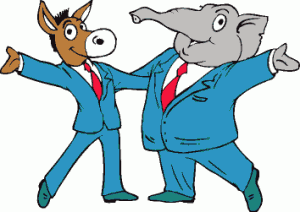Being a Mindful, Politically Engaged Buddhist
 Minds are turning towards politics, especially in the US where we have a big election coming up. Arguments and opinions are flying back and forth, along with facts and misinformation. As Buddhist practitioners, we are handed challenges in many forms.
Minds are turning towards politics, especially in the US where we have a big election coming up. Arguments and opinions are flying back and forth, along with facts and misinformation. As Buddhist practitioners, we are handed challenges in many forms.
I’ve often heard it said that Buddha taught we aren’t supposed to have opinions or views, but this is a misunderstanding. For over 40 years, Buddha taught his views, and he often gave his opinions. What he warned against was “getting caught in a thicket of views.” As political issues come forward, we have to be mindful that we aren’t being ensnared in attachments and expectations of our views, regardless of what the views are. And often, as our views are challenged by those just as vehement with an opposing view, we need to be mindful of our emotional responses.
This political climate is a good one to discover where your emotional buttons are and how easily they are pushed. I find when anger arises, I need to take time to sit with the anger, to let the story go, and discover what the emotion is really rooted in. Sometimes it arises out of compassion for others and how certain views may be of harm, and at other times it arises because of attachment to my own viewpoint.
Another misconception I often hear regarding Buddhism is that one must be passive. Again I remind you the Buddha spent a lot of time in active conversation, traveling to teach, and to engage himself in the problems of his day. Buddha was by no means passive.
As Buddhist practitioners living in a time where we are raising families, working at careers, and mingling in society, it’s important to also be engaged politically and to be mindful of how we interact with the political climate around us. While some are in the position of being able to donate money, others engage by signing petitions, volunteering, writing articles, and actively conversing with people to help educate others.
However we decide to engage in the political process, we can use every bit of it in our practice, using the Eightfold Path as guide posts. I’m finding more often than not I am challenged by Right Speech as I communicate with those of opposite political views. I often have to stop, take a breath, and remind myself that I want to keep my words productive. Sometimes it’s necessary to say no more, as it’s either pointless or is just going to provoke more anger. Sometimes I just need to be more precise in my wording, so that those reading the thread may find it useful even if the person I’m aiming the message at isn’t going to be open to it. And always, I have to check my intention behind my words: Am I saying this to inform, or to spout my view? Are my words going to be helpful or harmful?
I’m also being mindful to my own potential bigotry or hypocrisy. Separation of church and state is very important to me, so when I advocate certain Buddhist teachings I try to be especially sensitive that we do not promote Buddhism in schools or the workplace. It’s perfectly fine to promote aspects of a religion, such as compassion, mindfulness, and even meditation. But to say the “B” word to school students or in the workplace would indeed be a violation of separation of church and state, even though Buddhism doesn’t technically have a church, and secular Buddhism doesn’t have religious aspects.
 Lastly, I find I have to be especially mindful to how much political information I expose myself to, mindful of the types of sources I use, and I’m being more mindful to the conversations I’m willing to engage myself in. Let’s face it, some sources and some conversations are just downright poisonous and will quickly infect the mind of just about anyone with rage and frustration. All political parties are doing their best to pit themselves against one another in a war of vehement hatred. We don’t have to buy into this. Hatred is never helpful, and will only cause suffering.
Lastly, I find I have to be especially mindful to how much political information I expose myself to, mindful of the types of sources I use, and I’m being more mindful to the conversations I’m willing to engage myself in. Let’s face it, some sources and some conversations are just downright poisonous and will quickly infect the mind of just about anyone with rage and frustration. All political parties are doing their best to pit themselves against one another in a war of vehement hatred. We don’t have to buy into this. Hatred is never helpful, and will only cause suffering.
As mindful Buddhist practitioners, I feel all of this is fodder for our practice, and that the best way we can help others is to be models of calm and reason, to be mindful of our reactions and engagements, so at the least we don’t worsen the climate, and at best we help others to chill out and engage practically and wisely.
But we can only do that if we are mindful, use every situation as a way of practicing the Eightfold Path, and remembering that we are all in this together, suffering in similar ways, and wanting to improve life for all.
